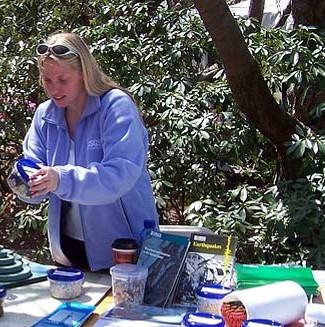Librarian Emily Wild reflects on the passage of “Emily Law”
In recognition of Earth Month, Princeton University Library puts the spotlight on Chemistry, Geosciences, and Environmental Studies Librarian, Emily Wild. Prior to Princeton, Wild spent 22 years as a hydrologist and librarian (physical scientist) at the U.S. Geological Survey. She has a Bachelor of Arts in Geology from Hartwick College and a Master of Library and Information Studies from the University of Rhode Island. Emily’s scholarly interests include library instruction; reference, citation and data management; raw and geospatial datasets; and physical and laboratory sampling methods.

In that time, she was instrumental in the passage of Chapter 15.8 the Water Use and Efficiency Act, informally known as “Emily Law,” in Rhode Island, where through a series of “Water Use and Availability” studies, she identified all water users by watershed (and town) and the impact of water withdrawals during periods of little-to-no precipitation (drought scenarios). By identifying the State’s metered and unmetered (estimated) water withdrawals and interbasin transfers for water use, Emily provided the State with an analysis of data gaps in water withdrawals and use needed to more accurately estimate water available for communities, especially during times of drought. The “Water Use and Efficiency Act,” encourages water providers to manage water supply withdrawals and use for strengthening source water and supply planning for the present and the future by accounting for the water withdrawals and use within the distribution system.
For Earth Month, Wild recounted the role she played in getting “Emily Law” into legislation.
Emily Wild on “Emily Law”
While working in Rhode Island, I was overseeing the lending library, helping state officials find data and publications, organizing and attending outreach events in Boston and Providence, fieldwork, database management, data entry, and working on local, regional, and national projects on the topics of water-use and availability, groundwater, and water quality.
I was giving presentations to water-resource managers, as well as bibliographic and data-access instruction sessions to geology and hydrology stakeholders. From 2001-2008, I gave frequent presentations to the Rhode Island Resources Board and Public Drinking Water Protection Subcommittee, while also providing technical support in relation to water quality and quantity data. Because of my detailed scientific explanations of hydrological data during meetings and presentations, I was asked to be on the Rhode Island Water Allocation Program Advisory Committee, Water-Use Reporting Subcommittee.
The Rhode Island General Assembly recognized the community, agricultural, and industrial concerns for water supply and availability during drought conditions, so the House and Senate began hearings to investigate the issues and facts. Because I was working on several water-use and availability projects in Rhode Island, and I was the water-use specialist for Massachusetts and Rhode Island, I was asked to provide water-use and available data to state water-resource managers, which were to be presented by stakeholders during the House and Senate hearings. I attended all the hearings, and I was later asked to prepare a United States Geological Survey (USGS) presentation of my work for one of the hearings, which my supervisor, Robert Breault, presented to the legislative committee.
Though funded by several USGS projects, the USGS was asked if I could be available to provide onsite technical assistance to the State of Rhode Island, which resulted in a USGS Memorandum of Understanding with the Rhode Island Water Resources Board, where I was assigned on a detail to be available to explain geological and hydrological data during the legislative process at the Rhode Island State House in Providence.
Concurrently, during the proposed water-use legislative activities, I was on the Rhode Island Drought Committee from 2006- 2008, giving monthly presentations and providing technical assistance related to current USGS surface-water and groundwater levels. Because I provided the State of Rhode Island with a considerable amount of USGS data from my projects, most water managers and my colleagues referred to the proposed water-use legislation as the “Emily Law.” In 2009, the Rhode Island General Assembly established the “Water Use and Efficiency Act,” and many of my colleagues contacted me, I was later working in the USGS Denver Library, and exclaimed, 'the Emily Law was passed!!!'
Interested in chemistry, geosciences, or environmental studies? Schedule an appointment with Wild on the PUL website.
Published on April 25, 2023
Media Contact: Barbara Valenza, Director of Library Communications
Newsletter
Subscribe to Princeton University Library’s e-newsletter for the latest updates on teaching and research support, collections, resources, and services.
